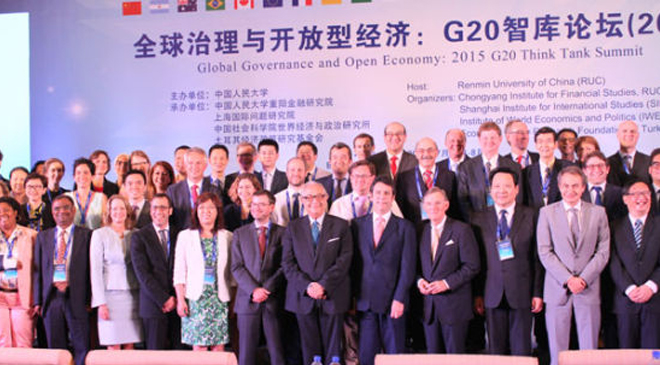G20 Summit 2016 to boost global governance

A family photo of scholars attending the third G20 Think Tank Forum
As the host of the G20 Summit in 2016, China is setting the theme and agenda for the event. At a recent forum, scholars said the meeting will promote global governance.
Sponsored by Renmin University of China, the third G20 Think Tank Forum was held from July 30 to Aug. 1 in Beijing and attended by more than 100 think tank scholars and representatives from 23 countries. With the theme “Global Governance and Open Economy,” it passed a 19-article joint statement in which fostering an open world economy was highlighted.
At past meetings in the United States, the United Kingdom and Australia, G20 members have explored ways to restore growth, promote trade, expand investment and perfect governance. The group of powerful nations will continue working toward the task of forging strong partnerships and building an open world economy at the upcoming gathering in Antalya, Turkey, and beyond. Attendees at the forum predict that the summit in China will bring more policy ideas and proposals on this topic.
“Economies around the world will advance if they open to each other, and fall into recession if they wall themselves off,” said Zhang Jun, head of the Department of International Economic Affairs at China’s Foreign Ministry.
International trade growth has been slower than world economic development for several consecutive years. Inhibiting the long-term vigor of the world economy, the sluggish global trade will ultimately jeopardize interests of all parties concerned, Zhang said.
“As trade powers, G20 members are capable of and responsible for spearheading the opening of the world economy and encouraging the construction of a free, open global market with shared benefits,” Zhang said, calling on them to safeguard multilateral trade mechanisms and push for breakthroughs from WTO’s Doha Round negotiations.
Harold McGraw, president of the International Chamber of Commerce, suggested that the 2016 summit make a difference in breaking trade barriers and expanding cross-border trade. “We should focus on some articles in the Trade Facilitation Agreement, which will open a door to us,” he said.
The G20 is headed inexorably toward a future in which developing and developed countries are equal partners in making decisions on financial governance, scholars at the forum said, adding that the China summit will continue to push ahead with international financial reform as part of the efforts to increase the voice of emerging markets and developing countries.
Yuksel Gormez, senior economist at Turkey’s central bank, pointed out that China is the largest exporter in the world and also the largest importer of foreign investment. Highlighting the possibility that China may become the largest overseas investor, he said China will hopefully become a paradise for external and internal investment.
“In the foreseeable future, China is very likely to be an important determinant of capital flow across the globe,” Gormez said.
In such a context, the International Monetary Fund, the World Bank and other international financial institutions should reorganize themselves to reflect new trends in the new world, Gormez said. Meanwhile, new global financial institutions set up by China and other countries should also be accepted. “It will bring a benign cycle for global well-being,” he said.
“In terms of development potential, the Asia Infrastructure Investment Bank (AIIB) will probably be an embryo organization for a new international financial governance mechanism,” said Antonino Villafranca, head of the European Programme at the Italian Institute for International Political Studies.
From his standpoint, Western powers should not be too sensitive about the changes new financial institutions bring to global governance, while emerging countries should share with developed countries the mission of reshaping the current international system rather than sabotaging it. Effective coordination between the two sides will prompt improvements in international organizations and enhance the capacity of global public goods, he said.
Over the past seven years, the G20 has left an indelible mark on the history of international economic cooperation. “Nonetheless, as a new international mechanism, it has unavoidable defects in structure and operation,” said Yang Jiemian, director of the Academic Committee at Shanghai Institutes for International Studies.
Forum attendees anticipated that the G20 summit in China will take measures to strengthen the execution of commitments. Ligia Maura Costa, a professor from the Sao Paulo Business Administration School in Brazil, proposed installing a G20 executive secretariat that is charged with preparation and follow-up work as an effective way of coordination for managing G20 commitments.
John Kirton, director of the G20 research group at the University of Toronto in Canada, predicted that a new organ dedicated to addressing G20-specific problems, which resembles the Sydney global infrastructure center proposed at the G20 Brisbane Summit 2014, might be instituted in China in 2016. A fully empowered G20 standing secretariat is also possible, he said.
Mao Li is a reporter at the Chinese Social Sciences Today.
